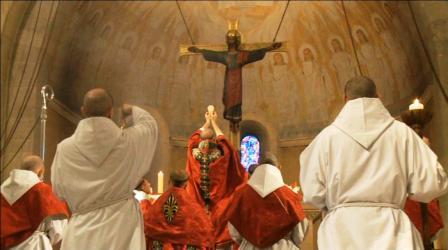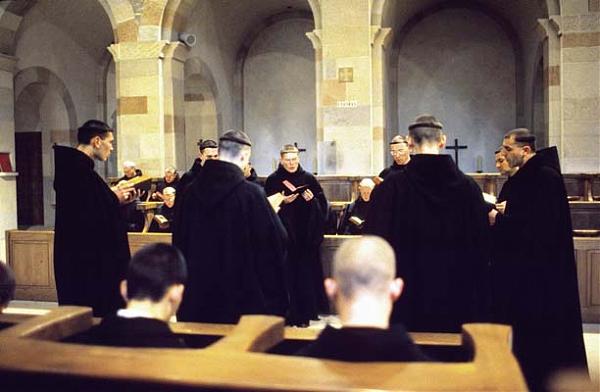
At times when things become frightening, when we are anxious and afraid, we are comforted to know that prayers are always being said in the Orthodox monasteries, the Rt. Rev. John Abdalah, spiritual advisor to the North American Board of Antiochian Women, told the group at their last meeting.
“It is a blessing to know that we have men and women in the Church who have dedicated themselves to a life of prayer and worship.” As a result, the Church around the world at every hour of the day is praying without ceasing (1Thessalonians 5:17), even when you and I cannot, wrote Fr. Steven Salaris, presbyter of All Saints of North America Antiochian Orthodox Mission in Maryland Heights, Missouri (“
Monasticism: The Angelic Evangelic Life,” The WORD, March 2010).
The most important work of the monastery is to pray. “Our entire life and our day-to-day activities are all scheduled around the daily cycle of services,” said Mother Abbess Gabriella of the Dormition of the Mother of God Orthodox Monastery, founded in 1987 in Rives Junction, Michigan. Joy Corey of Antiochian Women of St. John the Baptist Antiochian Orthodox Church in Post Falls, Idaho, and speaker at the first Midwest Antiochian Women’s retreat held in 2006 at the Monastery, discussed prayer in her book, The Tools of Spiritual Warfare:
Prayer is to the Christian what food is to the hungry. Without prayer our spirits die. We become carnal and spiritually dead without nourishment for our soul. Without prayer, we belong to the earth instead of heaven; we lose not only our communication but also our communion with God. Prayer begins when we open our hearts to God and proceeds into silence, the language of heaven. It is in silence that we learn to hear and know God. God is not far away that we need to strain to hear or know Him. God lives within our heart of hearts or the spirit within the spirit, what the Church fathers call the nous. Only with a quiet mind and a quiet heart can one begin to hear the ‘still, small voice’ of God.
“The first major activity of the monastery after prayer is hospitality,” Mother Gabriella said. St. Paul says, “Do not forget to entertain strangers, for by so doing some have unknowingly entertained angels” (Hebrews 13:2). The monastery is a haven of spiritual retreat from the stress of the secular world, a place for spiritual guidance and growth.
For the past five years the Midwest Antiochian Women of the Diocese of Toledo and the Midwest have sponsored a weekend retreat at the Dormition monastery. About fifty women attend. At a retreat, one of the women reminded us of a story that was in the news: a woman was held against her will for many years by her father. She had given birth to his children and recently she had escaped. The woman at the retreat pointed out that in Church we had been praying for her while she was locked up, because we pray for “captives and their salvation.”
Typically, some of the Midwest Antiochian women arrive at the monastery on Friday evening and attend evening prayer services. On Saturday morning they attend services beginning at 6:30 a.m. and continue through Divine Liturgy, which starts at 9 a.m. There is brunch with Mother Gabriella and the other nuns, followed by a featured speaker who presents a program from noon to 4 p.m. At 6 p.m. they attend the Vigil, combined Vespers and Matins, and on Sunday morning they attend 10 a.m. Divine Liturgy. The retreat is our time to pray without ceasing with the nuns and with other Antiochian Women. It is an opportunity for spiritual renewal, as our life for a few days will be scheduled around the daily cycle of services.
Mother Abbess Christophora of the Orthodox Monastery of the Transfiguration, founded in 1967 in Ellwood City, Pennsylvania, said that “living in a monastery, we have an ongoing opportunity to witness pilgrims coming to pray; seekers coming to observe and question; wealthy, poor, sick and healthy entering our doors to offer their prayers to Almighty God. Others phone or write with requests for prayers, comfort or assistance. In each of these moments Christ is present giving His peace, His hope, His love... What a miracle that monasteries continue to exist in our modern, busy and secular world.”
Antiochian Women are happy to support the new Antiochian monastery, the Convent of Saint Thekla at Antiochian Village, and Mother Abbess Alexandra. The building of St. Thekla was the annual project of the Women in 2010 and is still its project for 2011. The parish chapters each raise funds; individuals may also donate. The other Antiochian Orthodox monastic presence in the United States is St. Paul’s Skete located outside Memphis, Tennessee, where Mother Nektaria lives.
It has been said that monasticism is indispensable for the healthy nourishing of an Orthodox Church. The Monastery of St. Tikhon of Zadonsk was the Church’s first monastery in the United States, founded in 1905 in the village of New Caanan, in the Pocono Mountains of northeastern Pennsylvania. St. Tikhon’s was established in conjunction with a home for the orphaned children of Russians in America. It was also founded as a “mother house” for the monastics who were serving as clergy in the Orthodox Church.
Hieromonk Arseny (Chagovtsev, the future Archbishop Arseny of Winnipeg) felt that the monks serving in the Orthodox North American mission needed a monastery in which to be “acclimatized” to the American situation and where they could return periodically for spiritual renewal. Others not only endorsed the proposal, but also brought up the idea of starting an Orthodox theological seminary next to the monastery. It became known as St. Tikhon’s Seminary and was officially established in 1938.

In recent years many Orthodox monasteries have been started in this country. In all, there are 99 monasteries in the United States and 11 monasteries in Canada, according to the Orthodox Monasteries Worldwide Directory, found online.
Mother Abbess Alexandra of the Convent of St. Thekla
wrote in The WORD in September 2009, shortly after the convent was established: “Like other monastic houses in the world we hope that the Convent of Saint Thekla will be an oasis for the faithful to divest themselves of their busy lives and concerns and immerse themselves in the refreshing basics of Orthodox life – remembrance of God – in prayer and work. This focus is gradually acquired through asceticism, or spiritual training... When as a monastic we pray, ‘Lord, have mercy on me,’ we pray not only for our own salvation but for the salvation of all.”



 At times when things become frightening, when we are anxious and afraid, we are comforted to know that prayers are always being said in the Orthodox monasteries, the Rt. Rev. John Abdalah, spiritual advisor to the North American Board of Antiochian Women, told the group at their last meeting.
At times when things become frightening, when we are anxious and afraid, we are comforted to know that prayers are always being said in the Orthodox monasteries, the Rt. Rev. John Abdalah, spiritual advisor to the North American Board of Antiochian Women, told the group at their last meeting. In recent years many Orthodox monasteries have been started in this country. In all, there are 99 monasteries in the United States and 11 monasteries in Canada, according to the Orthodox Monasteries Worldwide Directory, found online.
In recent years many Orthodox monasteries have been started in this country. In all, there are 99 monasteries in the United States and 11 monasteries in Canada, according to the Orthodox Monasteries Worldwide Directory, found online.